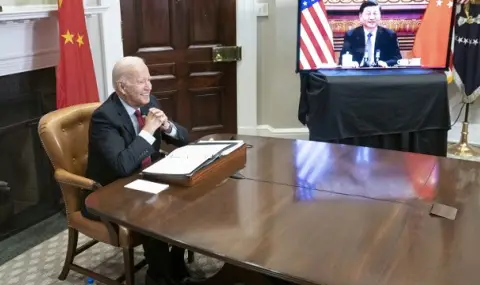Flows of information and energy underpin all economic activity, and high-tech in turn support both. This determines the high stakes in the technological war between the US and China, the first volleys of which echoed during the term of President Donald Trump (2017-2021), and continued under the administration of Joe Biden.
The confrontation between the world's two largest economies is changing relationships and supply chains around the world, writes the English-language magazine "Economist" (The Economist) in an analysis on the subject, cited by bTA.
According to estimates by the International Monetary Fund (IMF), if high-tech trade between the rival blocs were to stop, it would cost global gross domestic product (GDP) about $1 trillion, or 1.2 percent of global economic output.
Whether the US or China controls energy and information technology is an "ethnocivilizational question," explains Evan Ellis of the US Army War College.
The degree of tension is likely to increase in the coming years. Neither Biden nor Trump will deviate from a policy of confrontation with China. This is probably the issue that enjoys the most bipartisan support in Washington. For China, moving away from what it considers to be its rightful place in the global order is unthinkable, Ellis believes.
The next stage of the US-China tech war is likely to play out on two fronts. One represents the chip manufacturing that creates the world's data processing infrastructure, including that which trains and runs artificial intelligence programs.
The other conflicting topic is the "green" technologies that can become a "backbone" of the entire world economy. For Beijing, the strength of Chinese companies involved in such technologies is not just a natural consequence of two decades of targeted industrial policy, but an affirmation of China's important role as a world leader.
On April 23, the US Congress passed a bill requiring the Chinese owner of "TikTok" (TikTok) - "Bytedance" (ByteDance) to sell the platform within 270 days or it will risk being banned.
Soon after, the Chinese authorities forced the American technology giant "Apple" (Apple) to remove "WhatsApp" (WhatsApp) and "Treads" (Threads), platforms owned by "Meta" (Meta), from its Chinese app store.
Besides online giants, semiconductor manufacturing and energy also remain major fields of confrontation between the two countries.
US urges chipmakers to expand domestic production of cutting-edge technology. On April 8, the White House announced $6.6 billion in subsidies for Taiwanese manufacturer TSMC to build three new factories in the state of Arizona.
On April 15, another 6.4 billion dollars was allocated to the South Korean "Samsung" (Samsung) to build factories in Texas.
The funds are part of the US CHIPS and Science Act, which provides $280 billion in incentives to set up semiconductor factories and train workers.
To stimulate the "green" industry in the US, the US government has earmarked a $369 billion green subsidy package passed in 2022.
The Inflation Reduction Act (IRA) is also in Washington's arsenal, according to which a package of "green" subsidies worth $369 billion. The legislation supports local production of technologies related to the transition to climate neutrality through tax credits.
Against this backdrop, the US maintains high tariffs on imports of Chinese solar panels and electric cars, at 14.25 and 25 percent, respectively.
However, Chinese companies are the world leaders in the production of such "green" products: "Longi" (Longi) is the largest solar panel manufacturer in the world; CATL (CATL) is the largest battery manufacturer in the world, and BYD (BYD) competes with "Tesla" (Tesla) for the title of the largest manufacturer of electric cars.
Chip manufacturing in China, however, has not developed as impressively despite about $150 billion in state subsidies over the past decade. This is to some extent a measure of the US's success in blocking the flow of chip-making technology into the country over the past two years.
The first victim in the tech war between the US and China was "Huawei" (Huawei). It was the first Chinese company to be subject to export controls by the Trump administration, which now face similar restrictions.
Companies from a number of sectors related to chip manufacturing are now on high alert. "MGI Tech" (MGI Tech), a subsidiary of Chinese giant BGI, which makes genome sequencing equipment, is likely to come under fire.
Representatives of the Republican Party in the USA express indignation that the machines of "MGI Tech" are installed in European hospitals.
Multilateral controls on quantum computing technologies exported to China are also likely to be introduced, a Republican representative has explained. This could limit China's access to quantum computing and sensing technologies.
Last year, China imposed export controls on gallium and germanium, two materials of particular importance in the chip-making process. The country was the source of 98 percent of the world's gallium supply in 2022, as well as 60 percent of its germanium supply.
However, control over the export of materials is relatively "soft" measure compared to the US grip on intellectual property.
